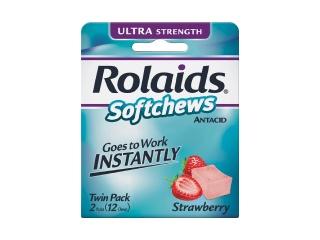Rolaids Ultra Strength Softchews Interactions
There are 435 drugs known to interact with Rolaids Ultra Strength Softchews (calcium carbonate / magnesium hydroxide), along with 8 disease interactions, and 1 alcohol/food interaction. Of the total drug interactions, 13 are major, 364 are moderate, and 58 are minor.
- View all 435 medications that may interact with Rolaids Ultra Strength Softchews
- View Rolaids Ultra Strength Softchews alcohol/food interactions (1)
- View Rolaids Ultra Strength Softchews disease interactions (8)
Most frequently checked interactions
View interaction reports for Rolaids Ultra Strength Softchews (calcium carbonate / magnesium hydroxide) and the medicines listed below.
- acetaminophen
- acetaminophen / hydrocodone
- Adalat CC (nifedipine)
- albuterol
- Aleve (naproxen)
- aspirin
- Bentyl (dicyclomine)
- famotidine
- folic acid
- gabapentin
- hydrocortisone
- hydromorphone
- ibuprofen
- lactulose
- Lantus SoloStar (insulin glargine)
- magnesium gluconate
- Norco (acetaminophen / hydrocodone)
- NovoLog FlexPen (insulin aspart)
- ondansetron
- Phillips' Milk of Magnesia (magnesium hydroxide)
- simethicone
- sumatriptan
- trazodone
- Tylenol (acetaminophen)
- verapamil
- Vitamin B12 (cyanocobalamin)
- Vitamin C (ascorbic acid)
- Xifaxan (rifaximin)
- Zantac (ranitidine)
- zolpidem
Rolaids Ultra Strength Softchews alcohol/food interactions
There is 1 alcohol/food interaction with Rolaids Ultra Strength Softchews (calcium carbonate / magnesium hydroxide).
Rolaids Ultra Strength Softchews disease interactions
There are 8 disease interactions with Rolaids Ultra Strength Softchews (calcium carbonate / magnesium hydroxide) which include:
- phosphate calcifications
- cardiac contraction/conduction
- malabsorption
- renal dysfunction
- sarcoidosis
- inflammatory bowel disease
- intestinal obstruction disorders
- renal dysfunction
More about Rolaids Ultra Strength Softchews (calcium carbonate / magnesium hydroxide)
- Compare alternatives
- Drug images
- Side effects
- Dosage information
- During pregnancy
- Drug class: antacids
Related treatment guides
Drug Interaction Classification
| Highly clinically significant. Avoid combinations; the risk of the interaction outweighs the benefit. | |
| Moderately clinically significant. Usually avoid combinations; use it only under special circumstances. | |
| Minimally clinically significant. Minimize risk; assess risk and consider an alternative drug, take steps to circumvent the interaction risk and/or institute a monitoring plan. | |
| No interaction information available. |
See also:
Further information
Always consult your healthcare provider to ensure the information displayed on this page applies to your personal circumstances.


